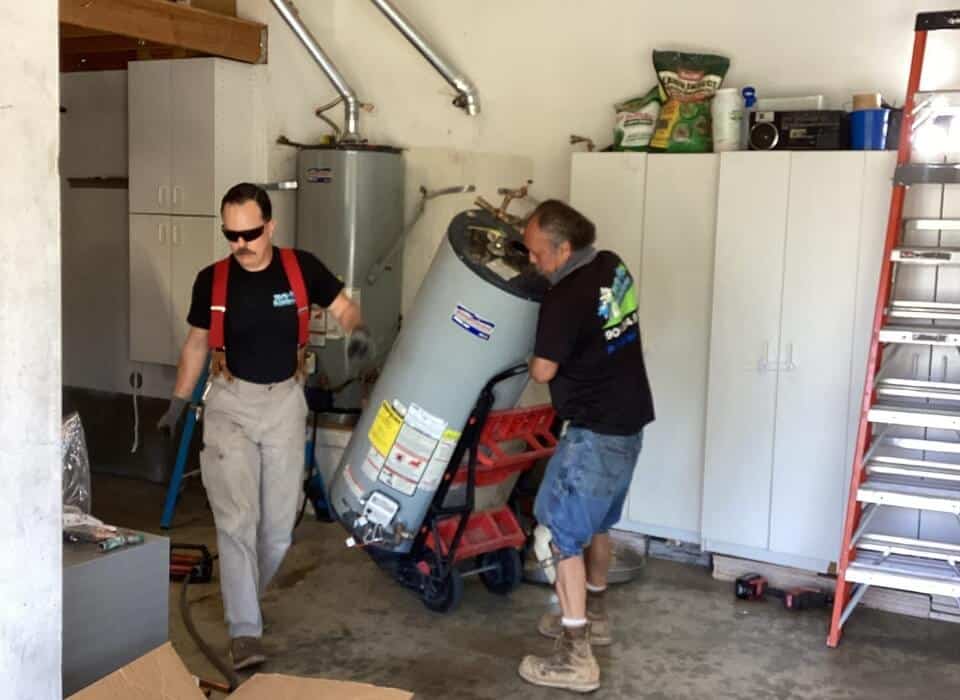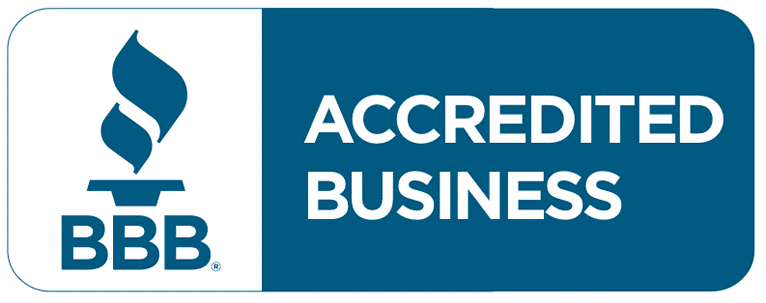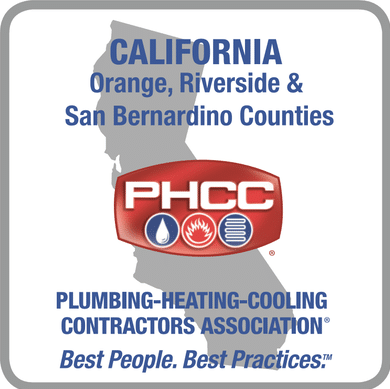
Here are some of the top quetions homeowners in and around Chino, CA, have about water heaters and our advice about the concerns about their water heaters.
What Size Water Heater Do I Need for My Home?
To determine the right size water heater for your home you’ll want to consider a few factors such as the number of people in your household, the peak hot water usage times, and your household’s hot water habits.
Calculate Peak Hour Demand
- Estimate your peak hour demand, which is the maximum amount of hot water your household uses during busy times (like mornings or evenings) and multiply it by the number of people in your home. A standard shower uses about 10 gallons of hot water per person. Example: If you have 4 people in your household, that’s 4 x 10 = 40 gallons.
- Consider other appliances like dishwashers and washing machines. These can use 1-2 gallons per minute and how long you typically run them. Example: If your dishwasher uses 1.5 gallons per minute and runs for 30 minutes, that’s 1.5 x 30 = 45 gallons.
- Add up all these estimates to get your peak hour demand. For the exmaples above that would be 85 gallons.
Water Heater Sizing
Now that you have your peak hour demand, you’ll want to choose a water heater that can handle this amount of hot water. Water heaters are typically sized by their storage capacity in gallons.
- Tank Water Heaters: These come in various sizes, typically ranging from 20 to 80 gallons. For a household with an 85-gallon peak hour demand, you might consider a 80-gallon tank to ensure you have enough hot water.
- Tankless Water Heaters: These heat water on demand and don’t store it. They are sized by flow rate in gallons per minute (GPM). Calculate how much hot water you’ll use simultaneously. Example: If your shower uses 2.5 GPM and your dishwasher uses 1.5 GPM, and you use them together, you’ll need a tankless heater with at least 4 GPM capacity.
Consider Other Factors for Tankless Water Heaters:
-
- Recovery Rate: How quickly the water heater can reheat the water. Higher recovery rates mean faster hot water replenishment.
- Energy Efficiency: Look for Energy Star ratings to save on energy costs.
Local Climate Considerations
Chino, CA, has a relatively mild climate so we will use the following recommendations:
- For a family of 4-5: A 50-80-gallon tank water heater or a tankless unit with 7-9 GPM.
- For smaller households or apartments: A 30-50-gallon tank or a tankless unit with 5-7 GPM may suffice.
What Are The Advantages of Standard Tank Water Heaters?
One of the main benefits of a storage-tank water heater installation is its reserved supply of hot water. Although neither gas nor electric water heaters heat water during a power outage, storage tank units are able to release previously heated water, even if there has been an interruption in electrical service.
Storage tank water heaters are appliances with large tanks used to store water. Cold water enters through the bottom of the tank and is heated. Once the water reaches a desired temperature, it is released through the hot water tap; the remaining warmed water is held inside the storage tank. Storage tanks are outfitted with insulative coatings and walls to help stored water retain its temperature.
Should I Choose an Electric or Gas Powered Water Heater?
Most homeowners choose an electric or gas water heater based on their home’s current power source. If you don’t have a gas line installation, you might opt for an electric water heater. While the initial investment is higher for a gas water heater, you’ll likely end up saving, since natural gas costs less than electricity.
How Does a Tankless Water Heater Work?
Whereas storage tank water heaters once monopolized the plumbing industry, tankless units are rapidly gaining popularity. Tankless water heaters function to provide hot water to homes and businesses. These units are long-lasting, space-saving, energy-efficient, and provide an endless supply of warmed water. Unlike storage tank units which hold hot water in their tank, tankless models heat water on demand. These devices are activated whenever a hot water tap is turned on in the house.
A flow sensing device activates either the gas burner or electric element in a tankless system and water starts heating up. Once the hot water tap is turned off, the burner or element turns off as well. Because tankless units don’t have to waste energy keeping their stored water warm, tankless units are considered more energy efficient. Tankless units also require less maintenance than storage tank units.
What Are The Advantages of a Tankless Water Heater?
Many home and property owners are choosing to install tankless water heaters in their homes and businesses. Benefits of tankless units include:
- Longer-lasting units. Storage tank water heaters last about 10 years. With proper maintenance and upkeep, tankless units can easily go for two or more decades. They also require less maintenance.
- Endless hot water. Whenever you turn on a hot water tap, a burner or heating element is activated. Because water gets warmed as it’s used, you don’t have to worry about someone using up all the hot water during their lengthy shower.
- Lowered energy bills. Tankless water heater installations use a flow-sensing device that powers on heating elements when the hot water tap is turned on. Because the system doesn’t have to spend energy keeping a tankful of water hot, tankless water heaters conserve up to 50 times as much energy as traditional water heaters.
- Space saving. Tankless water heaters can be mounted on walls and take up a lot less space than bulky, traditional water heaters.











